Treaty of Björkö
The Treaty of Björkö, known as the Treaty of Koivisto in modern Finland, was a secret mutual defense accord signed on 24 July 1905 in Björkö between Wilhelm II of the German Empire and Tsar Nicholas II of Russia.
 |
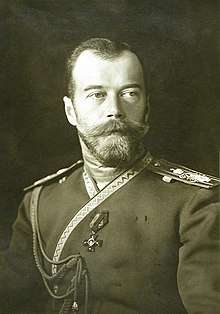 |
| Kaiser Wilhelm II | Tsar Nicholas II |
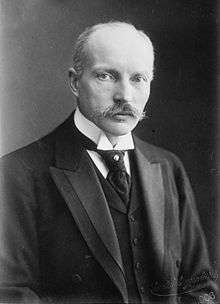 |
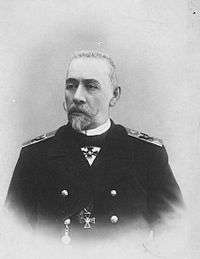 |
| Heinrich von Tchirschky | Aleksei Birilev |
Secret meeting
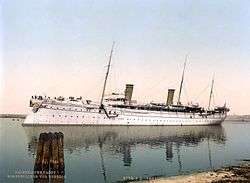
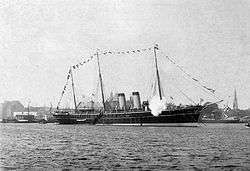
This secret mutual defense treaty was signed at a meeting arranged by Wilhelm II only four days beforehand. On the evening of Sunday 23 July 1905 the Kaiser arrived at Koivisto Sound from Vyborg Bay in his yacht, the Hohenzollern, which then dropped anchor near Tsar Nicholas' yacht, the Polar Star. Proof that the meeting took place is given by telegrams that they exchanged, dubbed the Willy–Nicky correspondence, made public in 1917 by the new revolutionary government in Russia.[1]
Treaty
The overall defense treaty contained four articles and was signed by Wilhelm II and Tsar Nicholas II, and further was countersigned by Heinrich von Tchirschky, head of the German Foreign Office, and Naval Minister Aleksei Birilev:[2]
Leurs Majestés les Empereurs de toutes les Russies et d'Allemagne, afin d'assurer le maintien de la paix en Europe ont arrêté les Articles suivants d'un Traité d'Alliance défensif.
Their Majesties the Emperors of all the Russias and Germany, in order to ensure the continuance of peace in Europe have decreed the following Articles of a Defensive Alliance Treaty.
Article I
En cas où l'un des deux Empires serait attaqué par une Puissance Européenne son allié l'aidera en Europe de toutes ses forces de terre et de mer.
In case one of the two Empires is attacked by a European Power, his ally will help it in Europe with all its land and sea forces.
Article II
Les hautes parties contractantes s’engagent à ne conclure de paix séparée avec aucun adversaire commun.
High Contracting Parties undertake not to conclude separate peace with any common adversary.
Article III
Le présent Traité entrera en vigueur aussitôt que la paix entre la Russie et le Japon sera conclue et restera valide tant qu’il ne sera pas dénoncé une année à l’avance.
The present Treaty shall enter into force as soon as peace between Russia and Japan is concluded and shall remain valid as long as it is not denounced a year in advance.
Article IV
L’Empereur de toutes les Russies, après l’entrée en vigueur de ce traité, fera les démarches nécessaires pour initier la France à cet accord et l’engager à s’y associer comme alliée.
The Emperor of all the Russias, after the entry into force of this treaty, will take the necessary steps to initiate France to this agreement and engage it to join as an ally.
Wilhelm I.R. Nicolas
Reaction
The treaty needed to be ratified by both the German and Russian governments.
Germany
The driving motive for the treaty on the German side was to undermine the Franco-Russian Alliance whilst simultaneously strengthening Germany’s position vis-à-vis Britain.[3] Initially drafted as a global mutual defence pact, Wilhelm’s insertion of the words "en Europe" into the first article, thereby restricting the treaty’s remit to Europe, put the Kaiser at odds with the German Reich Chancellor, Bernhard von Bülow, who had not been forewarned of the late amendment.[3] Bülow took the view that Russia’s support would be needed in relation to the British presence in India, whereas Wilhelm thought such operations would just draw Germany into a fruitless war in that region at the expense of Germany’s position in Europe.[3] Bülow threatened to resign over the disagreement, prompting a melodramatic letter from the Kaiser ending with the words, “if a letter of resignation arrived from you, the next morning would find the Kaiser no longer alive! Think of my poor wife and children!”[3] Bülow therefore offered to compromise but before the issue could be resolved on the German side, the Russian government rejected the agreement.[3]
Russia
Although Tsar Nicholas had signed the treaty, it was not ratified by his government because of the pre-existing Franco-Russian Alliance. The Russian prime minister Sergey Witte and foreign minister Vladimir Lambsdorff, neither present at the signing, nor consulted beforehand, insisted that the treaty should never come into effect unless it was approved and signed by France. Lambsdorff told the Tsar that it was "inadmissible to promise at the same time the same thing to two governments whose interests were mutually antagonistic".[4] The Tsar gave in to their pressure, much to the consternation of the Kaiser, who reproached his cousin: "We joined hands and signed before God, who heard our vows!... What is signed, is signed! and God is our testator!"[5] Wilhelm's chancellor, Count von Bülow, however, also refused to sign the treaty because the Kaiser had added an amendment to the draft (against the advice of the Foreign Office) which limited the treaty to Europe.[6]
References
- Fay, p. 48, citing from A. A. Knopf's work (ed. Herman Bernstein), The Willy-Nicky Correspondence (January 1918). "Nobody has the slightest idea of meeting. The faces of my guests will be worth seeing when they suddenly behold your yacht. A fine lark. Tableaux. Which dress for the meeting? Willy." (Original text, in English).
- Die Grosse Politik der Europäischen Kabinette 1871-1914, Vol.19, p. 465.
- Röhl, John C G (2008). Wilhelm II Into the Abyss of War and Exile, 1900-1941 (4th printing 2015 ed.). Cambridge, UK: Cambridge University Press. p. 354-380. ISBN 9781107544192.
- Reynolds, p. 23
- Cecil, p. 102
- Clark, p. 193
Sources
- Cecil, Lamar. Wilhelm II. UNC Press, 1996. ISBN 0-8078-2283-3.
- Fay, Sidney B. The Kaiser's Secret Negotiations with the Tsar, 1904-1905. The American Historical Review: Vol. 24, No. 1, pp. 48–72. October 1918.
- Reynolds, David. Summits. Six Meetings That Shaped the World. Basic Books, 2007. ISBN 978-0-465-06904-0
- Clark, Christopher. Kaiser Wilhelm II: A Life in Power. Penguin, 2009. ISBN 978-0141039930
- Die Grosse Politik der Europäischen Kabinette 1871-1914, Vol.19, Chapter 138: Der Vertrag von Björkoe (pp. 433–528), 1927.